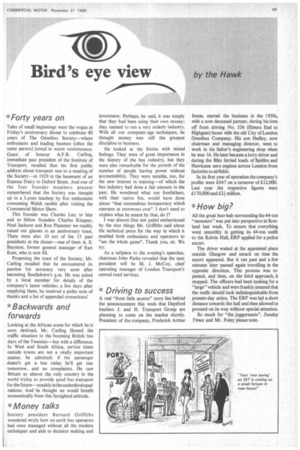Bird's eye view
Page 51

If you've noticed an error in this article please click here to report it so we can fix it.
by the Hawk *Forty years on
Tales of small beginnings were the vogue at Friday's anniversary dinner to celebrate 40 years of The Omnibus Society—where enthusiasts and leading busmen (often the same person) joined in warm reminiscence. Guest of honour A.F.R. Carling, immediate past president of the Institute of Transport, recalled that his first public address about transport was to a meeting of the Society—in 1929 in the basement of an Express Dairy in Oxford Street. And one of the four founder members present remembered that the Society was thought up in a Lyons teashop by five enthusiasts consuming Welsh rarebit after visiting the Commercial Motor Show.
This founder was Charles Lee; to him and to fellow founders Charles Klapper, Noel Jackson and Ron Plummer we readily raised our glasses in an anniversary toast. There were also 10 out of the 15 past presidents at the dinner—one of them A. E. Baynton, former general manager of East Kent, who is now 88.
Proposing the toast of the Society, Mr. Carling recalled that he encountered its passion for accuracy very soon after becoming Southdown's g.m. He was asked by a local member for details of the company's latest vehicles; a few days after supplying them, he received a polite note of thanks and a list of appended corrections!
*Backwards and forwards
Looking at the African scene for which he is soon destined, Mr. Carling likened the traffic situation to the booming British bus days of the Twenties—but with a difference. In West and South Africa, service times outside towns are not a vitally important matter, he admitted; if the passenger doesn't get a bus today he'll get one tomorrow, and no complaints. He saw Britain as almost the only country in the world trying to provide good bus transport for the future—notably in the underdeveloped nations. And he thought we would benefit economically from this farsighted attitude.
*Money talks
Society president Bernard Griffiths wondered wryly how on earth bus operators had once managed without all the modern techniques and aids to decision making and investment. Perhaps, he said, it was simply that they had been using their own money; they seemed to run a very orderly industry. With all our computer-age techniques, he thought money was still the greatest discipline in business.
He looked at the Sixties with mixed feelings. They were of great importance in the history of the bus industry, but they were also remarkable for the growth of the number of people having power without accountability. They were notable, too, for the new interest in training—of which the bus industry had done a fair amount in the past. He wondered what our forefathers, with their native fire, would have done about "that tremendous bureaucracy which operates at enormous cost". T don't need to explain what he meant by that, do I?
1 was almost (but not quite) embarrassed by the nice things Mr. Griffiths said about the technical press for the way in which it enabled both enthusiasts and operators to "see the whole game". Thank you, sir. We try.
As a tailpiece to the evening's speeches, chairman John Parke revealed that the next president will be M. J. McCoy, chief operating manager of London Transport's central road services.
* Driving to success
A real "from little acorns" story lies behind the announcement this week that Deptford hauliers J. and H. Transport Group are planning to come on the market shortly. President of the company, Frederick Arthur Jeune, started the business in the 1930s, with a now deceased partner, during his time off from driving No. 536 (Elmers End to Highgate) buses with the old City of London Omnibus Company. His son Hedley, now chairman and managing director, went to work in his father's engineering shop when he was 16. He later became a lorry driver and during the Blitz ferried loads of Spitfire and Hurricane aero engines across London from factories to airfields.
In its first year of operation the company's profits were ,E647 on a turnover of-£l.2,000. Last year the respective figures were £170,000 and £21 million.
*How big?
All the great hoo-hah surrounding the 44-ton "monsters" was put into perspective in Scotland last week. To ensure that everything went smoothly in getting its 44-ton outfit to the Kelvin Hall, ERF applied for a police escort.
The driver waited at the appointed place outside Glasgow and smack on time the escort appeared. But it ran past and a few minutes later passed again travelling in the opposite direction. This process was repeated, and then, on the third approach, it stopped. The officers had been looking for a "large" vehicle and were frankly amazed that the outfit should look indistinguishable from present-day attics. The ERF was led a short distance towards the hall and then allowed to proceed on its way without special attention.
So much for "the juggernauts". Sunday Times and Mr. Foley please note.




































































































